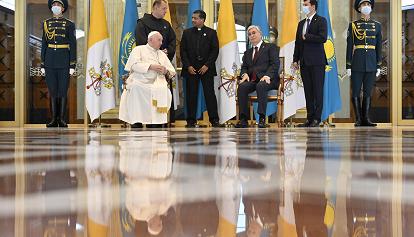Rome, 13 October 2022 – In January 2022 we talked about the revolt in Kazakhstan due to rising energy prices, just under a month after the Russian invasion of Ukraine. The president of the presidential republic – with one-party government – Kassym Jomart Tokayev he had fired the government and imposed a curfew. According to several international analysts, one of the actors in the January crisis was undoubtedly the former head of state, the “father of the nation” Nursultan Nazarbayev. Kazakhstan, one of Russia’s most traditional and faithful satellite countries Vladimir Putintheater of the apostolic journey of Pope francesco from 13 to 15 September last. We interviewed Vania De Luca, vaticanista of tg3 Raiamong the delegated journalists on the papal flight sent to Nur-Sultan.
Kazakhstan is a crossroads of relevant geopolitical hubs. It plays a fundamental role in alleviating conflicts and here John Paul II came to sow hope immediately after the tragic 2001 attacks on the Twin Towers and the Pentagon in the United States. Pope Francis said.
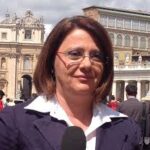
Vania De Luca, in your opinion, how important was it, from a geopolitical point of view, to organize the Congress of Heads of World and Traditional Religions in Kazakhstan?
I believe that any initiative aimed at bringing together leaders and religious leaders in person in order to foster mutual knowledge and common paths in the name of peace and fraternity is more than useful, precious. In the case of Kazakhstan, the Congress you mentioned was an event that reached its seventh edition (the first was in September 2003, on the initiative of the first President of the Republic of Kazakhstan, Nursultan Abishevich Nazarbayev).
For the first time a Pope took part, and therefore the presence of Francis was a novelty. On the agenda there was originally a debate on spirituality and society in the post-pandemic, but then the war in Ukraine came to force a review of the program and priority themes. “We will meet as brothers”, was the pope’s wish before his departure, “animated by the common desire for peace that the world is thirsty for”. The religious leaders were arranged around a large strictly round table (even if the presence of the Pope was central to the placement in the room of the highly selected guests and accredited journalists). There were more than 80 delegations, exponents of Buddhism, Taoism, Hinduism, Zoroastrianism and Shintoism, the Chief Rabbi of Israel Yitzhak Yosef, and the Grand Imam of al-Azhar al-Tayyeb, a Sunni Muslim, co-signer with Pope Francis, in 2019 in Abu Dhabi, of the document on human brotherhood for world peace and common coexistence. There were syntonies and differences, harmony despite diversity but also distances. The Patriarch of Kirill did not arrive from Moscow, but Metropolitan Antonio, who spoke face to face with the Pope in one of the bilateral meetings provided for in the program.
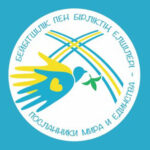
For the 38th apostolic journey Pope Francis chose the heart of Asia, what message did he want to give to the community of the countries of this area?
Heart of Asia and at the same time a great country (among the ten largest in the world), which is a crossroads: bordering Europe, Russia and China, on the route of the ancient Silk Road and hosting the expo in 2017. A a country that has known the gulags in which the Soviets imprisoned political dissidents and which welcomed John Paul II in 2001, who arrived to “sow hope” a few days after the attack on the Twin Towers, and 10 years after the proclaimed independence from the Russian orbit. I would say that the great message brought by the Pope can be summarized around the invitation not to face conflicts with the reasons of force, which turn out to be “inconclusive”, but rather to accept the “challenge of peace”, in a marked historical period ” from the scourge of war, from a climate of exasperated confrontation, from the inability to take a step back and reach out to the other ”. What can religions do together for peace? This seems to me to be the great question that moves the Pope’s many steps, including the next trip, at the beginning of November, to Bahrain. “A leap is needed and it is necessary, brothers and sisters, that he comes to us”, he told Nur Sultan, inviting the great religions, which constitute the soul of so many cultures and traditions, to an active commitment to peace: “We do not justify never violence. We do not allow the sacred to be exploited by the profane. May the sacred not be the prop of power and power should not be props of sacredness! God is peace and he always leads to peace, never to war ”.
The Pope’s reminder of the need to broaden the diplomatic commitment in favor of dialogue and encounter did not go unnoticed by the Pope. What results have been achieved?
More than the results achieved, I think it is useful to talk about results yet to be achieved, and not for a generic philanthropism, but because there is a real risk of a nuclear conflict that after Hiroshima and Nagasaki we thought archived as an error of history. At the same time there is the Earth, the common home, which is asking for a change of direction if the devastating effects of climate change and the indiscriminate exploitation of natural resources are not to be made irreversible. Themes emerged strongly in Nur Sultan. What the Pope is trying to do, with gestures and words, is a change of cultural paradigm which, thinking of the future, of young people, promotes encounter, dialogue, patient negotiations, and at the same time solidarity, sharing, a peace linked to justice, the fight against inequalities. At the press conference on the return flight, he praised the country’s desire to make those who are usually discarded, namely religious leaders, as far-sighted, given that religious values are among the things that are discarded today.
Before meeting with the authorities, the Pope met President Kassym-Jomart K. Tokayev in the golden presidential palace of Ak Orda for the welcome ceremony in Kazakhstan. And in the crowded auditorium, sitting next to the president – who recalled the thirty years since the start of diplomatic relations between Kazakhstan and the Vatican – Francis expressed his appreciation for the renunciation of nuclear weapons that this country has undertaken with decision , as well as for the development of energy and environmental policies focused on decarbonisation and investment in clean sources. What was your approach to this country?
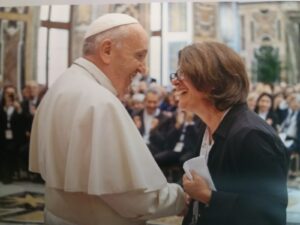
In the many journeys I have followed since the beginning of my pontificate, I have experienced first-hand that Pope Francis has a particular predilection for border countries, for crossroads. In Kazakhstan he remembered immediately the approximately one hundred and fifty ethnic groups and more than eighty languages present in the country, with varied histories, cultural and religious traditions: “they make up an extraordinary symphony”, he said, “and make Kazakhstan a unique multi-ethnic, multicultural and multi-religious laboratory, revealing its peculiar vocation, that of being “Country of the meeting “, in which “religious freedom is the best riverbed for civil coexistence”. The word “Kazakh” evokes free and independent walking, and the protection of freedom, the Pope underlined, “translates into civil society mainly through the recognition of rights, accompanied by duties“. In a 70% Muslim country, with Christians around 26% (mostly Orthodox, just 1% Catholics), Francis assured that the latter, “present in Central Asia since ancient times, wish to continue to testify to the spirit of openness and respectful dialogue that distinguishes this land ”. The Pope’s meeting with the religious in the cathedral on the last day of the visit was moving and joyful, under the gaze of an icon of Mary, Mother of the Great Steppe.
The Pope in China. What can it mean for the eastern geopolitical chessboard? Could it be a factor of relaxation in relations with the West?
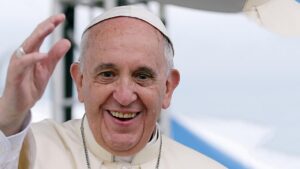
Where the Pope arrives, a pilgrim of peace arrives, and Francis has confirmed the willingness, as well as the willingness, to go to Beijing (as indeed to Moscow) on more than one occasion, including the flight to Nur-Sultan, when face to face with a journalist he reiterated that he was ready to visit China, which also continues to invest important resources in Kazakhstan, especially in the energy sector. Just in the days when Pope Francis was in Nur Sultan Chinese President Xi Jinping was in the Kazakh capital to meet Tokaev, after having already seen Putin in Uzbekistan, but a meeting with the Pope was not on the agenda, nor were the conditions created because could happen. After all, Pope Francis has always said that he is available, ready and open to every meeting, but under the right conditions, at the right time. China is a giant, he told the press conference on his return from Kazakhstan, he reminded the Vatican-Chinese bilateral commission that it is doing well, albeit slowly, “because the Chinese pace is slow”, but always, with dialogue, ” progress is being made ”.
THE

